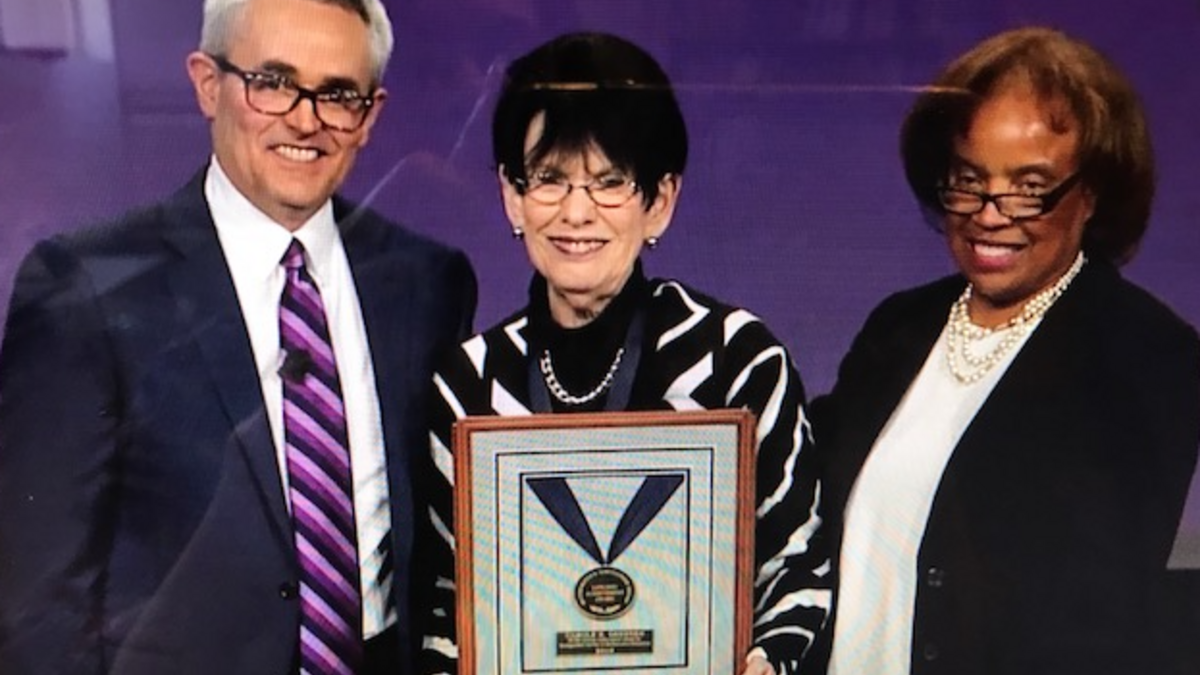ASU's Greenes receives 2018 Lifetime Achievement Award

Carole Greenes (center) receives a 2018 Lifetime Achievement Award from the National Council of Teachers of Mathematics.
Carole Greenes has been honored with the 2018 Lifetime Achievement Award from the National Council of Teachers of Mathematics (NCTM).
VIDEO: Greenes receives award during NCTM Annual Meeting and Exposition opening session
Since 2010, Greenes has served as director of Arizona State University’s Practice Research and Innovation in Mathematics Education (PRIME) Center, and as professor of mathematics education in the Ira A. Fulton Schools of Engineering and the College of Liberal Arts and Sciences. Greenes was dean of ASU’s School of Educational Innovation and Teacher Preparation on the Polytechnic campus from 2007–09, and associate vice provost for STEMscience, technology, education and math education from 2009–14. She continues to serve as director of the PRIME Center.
Greenes earned a degree in English, theater arts and music at the University of Michigan. While at Michigan, Greenes also took math courses “because they were easy for me.”
After graduating from college, Greenes taught public school during her husband’s medical training in Boston. After teaching for two years and looking for extra money to support the young couple, Greenes applied for a part-time position to tutor athletes in mathematics at Boston University.
“I always liked to make up weird math games and write unusual problems so that others want to solve them,” Greenes said.
Greenes earned her master’s and doctoral degrees in mathematics education while serving as a full-time member of the Boston University faculty. That’s also where she began the other major facet of her career.
“I had an adviser who told me that it’s important to start writing from the get-go, so I started writing books and articles,” Greenes said.
Her first book, “Problem Solving in the Mathematics Laboratory,” was published in 1972. More than 300 books have followed.
Years later, Greenes would combine her three career pursuits — research, teaching and writing — at ASU. As director of the PRIME Center, she oversees initiatives to increase pre-kindergarten, elementary, middle school, high school and college students’ success in the study of the sciences, technology, engineering, mathematics and computer science.
During one project, Greenes and PRIME Center Executive Director Mary CavanaghCavanagh is also a research assistant professor in Mary Lou Fulton Teachers College. created a math puzzle called MATHadazzle. Students and teachers taking part in the center’s research projects enjoyed the MATHadazzle puzzle so much they began writing puzzles. The center collected and edited contributions and published them in the “MATHadazzles Mind Stretch Puzzles” series. Volumes 1–3 were created by middle school teachers, volumes 4 and 5 by middle school students, volumes 6–8 by high school students, and the latest, volumes 9 and 10 by students in grades 2 and 3. Several of the student contributors have requested that more MATHadazzles be created.
“They continue to approach me with new ideas," Greenes said. "How can you refuse students who want to spend more time doing math?”
In addition to her many other publications, Greenes is editor of the Arizona Association of Teachers of Mathematics semiannual journal OnCore and author of the online monthly “MATHgazine Senior” (grades 8–12) and “MATHgazine Junior” (grades 4–8), both of which are available to Arizona students, teachers and families at no cost.
Among Greenes’ current research projects is App Maker Pro (AMP), funded by the National Science Foundation. AMP is a three-year project that capitalizes on the technology interests and talents of high school students to increase their interest in STEM fields and invites high school teachers to enhance their knowledge of technology applications to promote student learning. They do this by analyzing apps in particular domains and then designing new ones. Each AMP participant spends 21 months in the project. Each Design Village is co-led by an expert in the domain field and another in technology.
Greenes said university research such as hers plays a vital role in improving STEM education in the U.S.
“There are wonderful researchers here at ASU and across the country who are doing major research into how students learn mathematics,” she said. “They’re finding pedagogical methods we can employ to engage those students and at the same time enhance their enjoyment of the process of exploring mathematics.
“My research has been with students beginning at pre-kindergarten through college, trying to help them reveal their talents, and capitalizing on those to get them smarter,” Greenes said. “Every single one of my research projects has tried to do that. These students have so much talent that hasn’t been tapped or revealed. Students don’t even know how much they know until you put them into a situation where they have to bring that to bear to solve a problem. And once that happens, we have unbelievable results.”
More Science and technology
Largest genetic chimpanzee study unveils how they’ve adapted to multiple habitats and disease
Chimpanzees are humans' closest living relatives, sharing about 98% of our DNA. Because of this, scientists can learn more about…

Beyond the 'Dragon Arc': Unveiling a treasure trove of hidden stars
NASA's James Webb Space Telescope (JWST) has set a new milestone: capturing images of over 40 individual stars in a galaxy so…

ASU selected as home and partner for CHIPS and Science Act-funded national facility for semiconductor advanced packaging
Following a week where a spirited effort by the Sun Devil football team captured the nation’s attention in the Peach Bowl, it is…